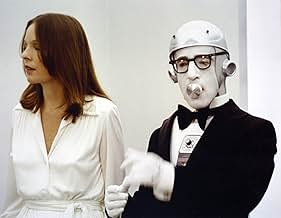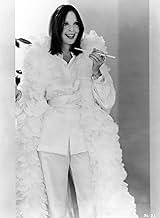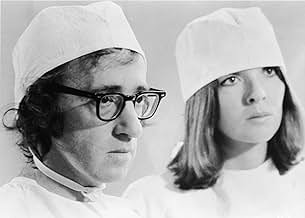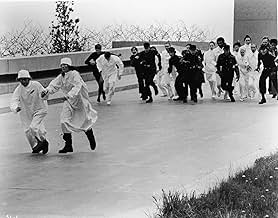AVALIAÇÃO DA IMDb
7,1/10
46 mil
SUA AVALIAÇÃO
O dono de uma loja nerd é revivido da criostase em um mundo futuro, para lutar contra um governo opressor.O dono de uma loja nerd é revivido da criostase em um mundo futuro, para lutar contra um governo opressor.O dono de uma loja nerd é revivido da criostase em um mundo futuro, para lutar contra um governo opressor.
- Prêmios
- 2 vitórias e 2 indicações no total
Mews Small
- Dr. Nero
- (as Marya Small)
Stanley Ralph Ross
- Sears Swiggles
- (as Stanley Ross)
John Cannon
- Various Voice-Overs
- (narração)
- (não creditado)
Myron Cohen
- Robot Tailor
- (não creditado)
- Direção
- Roteiristas
- Elenco e equipe completos
- Produção, bilheteria e muito mais no IMDbPro
Avaliações em destaque
Woody Allen's films are generally treasured among other comedies because of their wit and charm. Many critics would agree, though, that Allen's earlier films were among his best. One of those movies was a lighthearted film called `Sleeper,' which starred a younger version of Allen and a younger, but always beautiful Diane Keaton. Although `Sleeper' leaves a person in stitches from laughter, its one flaw is that it lacks an ending. But don't let that stop you from seeing this comedy classic. In the end, who cares where it goes because it's just flat out funny. `Sleeper' is the story of Miles Monroe (Allen), who is cryogenically frozen in 1973 after having a procedure in a hospital. He is awoken nearly 200 years later by a group of scientists who want Monroe to help them defeat the leader of their society, as America's future consists of a totalitarian state. While on his adventure through this futuristic world, Monroe meets a beautiful woman named Luna Schlosser (Keaton) who he begins to have a love interest in. The two team up to try to oust their tyrannical government and bring about freedom and prosperity. `Sleeper' was hysterical from beginning to end. The very opening scene shows Monroe covered in tin foil-clearly scientists in 1973 found new and amazing uses for this wonderful kitchen product. As soon as Monroe awakens, he is disoriented, smiling aimlessly into space and walking backwards and into people. Allen's comical blend of intellect and charm shows up soon after. The futuristic society is comprised of people who have no historical references for the events of the past 200 years, as their leader has undoubtedly outlawed certain forms of knowledge that could lead to rebellion. They use Monroe to fill in the historical gaps by showing him pictures of famous twentieth century individuals, such as Joseph Stalin. Monroe provides his own synopsis of their contributions to the world in his own clever way, as he does also for former President Nixon. Allen's writing, direction and performance were hilarious. Rarely do we see writing as clever and sidesplitting in today's comedies. The only other comic director today that could even compare to Allen would be Christopher Guest, whose mockumentary films such as `Best In Show,' and the recent `A Mighty Wind,' have a real source of comedy. Most present comedies are trivial, filled with rehashed jokes that depend more on toilet humor than any form of real wittiness. The film's only problem is that after an hour and a half, it doesn't seem to know what to do with itself. It ends on a clever note about love with the protagonists somehow managing to save themselves, but not really the day. They realize that perhaps the only thing worth fighting for, in the end is love. All in all, `Sleeper' was a very funny farce on science fiction stories, and it cemented Allen's ability to be an engaging and funny in his films. ***
A futuristic comedy from Woody Allen in 1973 has him waking up from an operation 200 years later (in 2173) to find society has gone berserk.
Clever, witty, and very funny. Allen is hysterically funny as the "sleeper" who gets to give history lessons on the 1970s, pose as a robot, and become a revolutionary to be near Diane Keaton.
Filled with sight gags galore and great one-liners. The giant vegetables and chicken are funny. And so is the "1984" political humor that fits the Bush era better than it did the Nixon era. Also very funny is Allen's extended Blanche du Bois speech.
Allen is excellent as is Keaton. John Beck plays a revolutionary. Mary Gregory is the doctor. George Furth is a party guest. Jackie Mason does the voice of the Jewish tailor.
A must see.
Clever, witty, and very funny. Allen is hysterically funny as the "sleeper" who gets to give history lessons on the 1970s, pose as a robot, and become a revolutionary to be near Diane Keaton.
Filled with sight gags galore and great one-liners. The giant vegetables and chicken are funny. And so is the "1984" political humor that fits the Bush era better than it did the Nixon era. Also very funny is Allen's extended Blanche du Bois speech.
Allen is excellent as is Keaton. John Beck plays a revolutionary. Mary Gregory is the doctor. George Furth is a party guest. Jackie Mason does the voice of the Jewish tailor.
A must see.
We are blessed that Woody was around, making movies as interesting as this when he was.
Already with this one, he began his vast exploration of movie techniques and devices that would last 25 years or so.
The idea is simple in this one: he wanted to use film slapstick from a bygone era. How better to situate that than to move the whole picture into a future era?
We have some truly classic stuff here. The banana joke, The mirror joke. The robot pantomime. The acting out of the Jewish dinner (done in later movies too). The inflated man joke. You can find all these in any number of Keaton. Marx, Laurel & Hardy movies.
The unifying string of time travel, a romance, the leader and his nose is too weak to make this a solidly recommended outing. And it wouldn't be for a couple years until Woody cared about the cinematography at all.
I had forgotten how pretty Diane Keaton was. Very.
Ted's Evaluation -- 2 of 3: Has some interesting elements.
Already with this one, he began his vast exploration of movie techniques and devices that would last 25 years or so.
The idea is simple in this one: he wanted to use film slapstick from a bygone era. How better to situate that than to move the whole picture into a future era?
We have some truly classic stuff here. The banana joke, The mirror joke. The robot pantomime. The acting out of the Jewish dinner (done in later movies too). The inflated man joke. You can find all these in any number of Keaton. Marx, Laurel & Hardy movies.
The unifying string of time travel, a romance, the leader and his nose is too weak to make this a solidly recommended outing. And it wouldn't be for a couple years until Woody cared about the cinematography at all.
I had forgotten how pretty Diane Keaton was. Very.
Ted's Evaluation -- 2 of 3: Has some interesting elements.
Before he became a "serious" filmmaker and gained the respect and admiration of film critics, Woody Allen was already entertaining millions of fans with such unashamedly silly comedies as 1973's 'Sleeper.' The science-fiction story concerns an unfortunate Miles Monroe (Allen), the 1970s owner of the Happy Carrot health-food store, who goes into St. Vincent's Hospital for a routine peptic ulcer operation and wakes up 200 years later in a terrifying police state. He is revived by a subversive underground rebel organisation to help uncover the secrets of the dreaded "Aries Project," and to overthrow the tyrannical government and its dictator. Along the way, Miles enlists the help of the neurotic and exuberant Luna Schlosser (Diane Keaton, who collaborated with Allen on multiple occasions, most notably in 'Annie Hall (1977)' and 'Manhattan (1979)').
A chaotic blend of razor-sharp satire and slapstick humour, 'Sleeper' contains enough of Allen's and co-writer Marshall Brickmann's trademark wit to remind us of what makes their later collaborations so brilliant. Of course, as Allen had yet to reach his creative peak, some of the jokes in the film work (the infamous Orgasmatron; the Volkswagen Beetle that starts up immediately after 200 years of neglect), whilst others aren't pulled off quite so well (the giant chicken; the mock Miss America pageant). In one memorable sequence, year 2173 historians show Miles a collection of historical items and photographs, and he idly gives off ridiculous explanations which they accept as fact. For example, yes, Howard Cosell's sporting reports were used as punishment for criminals who had committed a crime against the state!
The promotional posters for the film proclaimed: "Woody Allen Takes A Nostalgic Look At The Future." This, more than likely, refers to the style of comedy, which, aside from Allen's witty observations, very much evokes memories of the silent slapstick comedies of Lloyd, Keaton and Chaplin. Much like the latter did with most of his films, Allen wrote, directed, starred in and composed the score for 'Sleeper.' The score itself, which is very upbeat, New Orleans-style traditional jazz, was performed by the Preservation Hall Jazz Band with Allen sitting in on clarinet. 'Sleeper' may have been inspired by H.G. Wells' classic novel, 'The Sleeper Awakes,' which recounts the tale of a man who awakes from a 203-year sleep to find himself in a horrifyingly-transformed futuristic London.
Aside from including a wealth of instantly-quotable one-liners ("I'm not really the heroic type. I was beat up by Quakers"), Allen also has a lot of fun in his disorganised futuristic dystopia. After pouring too much "Instant Pudding" into a bowl, the overdone dessert practically comes to life and has to be beaten into submission with a broom; it is also revealed that, contrary to popular agreement in 1973, such substances as deep fat, tobacco and hot fudge are not only not unhealthy, but probably the best thing for your body! When Miles happens upon a garden of human-size fruit and vegetables, we just know that the giant banana peel is going to come into play somewhere, and, sure enough, Miles inevitably takes a tumble.
A chaotic blend of razor-sharp satire and slapstick humour, 'Sleeper' contains enough of Allen's and co-writer Marshall Brickmann's trademark wit to remind us of what makes their later collaborations so brilliant. Of course, as Allen had yet to reach his creative peak, some of the jokes in the film work (the infamous Orgasmatron; the Volkswagen Beetle that starts up immediately after 200 years of neglect), whilst others aren't pulled off quite so well (the giant chicken; the mock Miss America pageant). In one memorable sequence, year 2173 historians show Miles a collection of historical items and photographs, and he idly gives off ridiculous explanations which they accept as fact. For example, yes, Howard Cosell's sporting reports were used as punishment for criminals who had committed a crime against the state!
The promotional posters for the film proclaimed: "Woody Allen Takes A Nostalgic Look At The Future." This, more than likely, refers to the style of comedy, which, aside from Allen's witty observations, very much evokes memories of the silent slapstick comedies of Lloyd, Keaton and Chaplin. Much like the latter did with most of his films, Allen wrote, directed, starred in and composed the score for 'Sleeper.' The score itself, which is very upbeat, New Orleans-style traditional jazz, was performed by the Preservation Hall Jazz Band with Allen sitting in on clarinet. 'Sleeper' may have been inspired by H.G. Wells' classic novel, 'The Sleeper Awakes,' which recounts the tale of a man who awakes from a 203-year sleep to find himself in a horrifyingly-transformed futuristic London.
Aside from including a wealth of instantly-quotable one-liners ("I'm not really the heroic type. I was beat up by Quakers"), Allen also has a lot of fun in his disorganised futuristic dystopia. After pouring too much "Instant Pudding" into a bowl, the overdone dessert practically comes to life and has to be beaten into submission with a broom; it is also revealed that, contrary to popular agreement in 1973, such substances as deep fat, tobacco and hot fudge are not only not unhealthy, but probably the best thing for your body! When Miles happens upon a garden of human-size fruit and vegetables, we just know that the giant banana peel is going to come into play somewhere, and, sure enough, Miles inevitably takes a tumble.
I think I am going to have to rank this as Woody Allen's second-best (and second-funniest) movie... after the unbeatable "Annie Hall". Even after having seen the movie 3 or 4 times I still find myself amused by some of Allen's shtick... and his rarely-demonstrated adeptness at physical comedy. So many classic physical bits: riding around in the wheelchair... eating the rubber glove... the future scientists trying to force his slack body into a futuristic vehicle. After this movie Woody started to get a little too cerebral... this was his last attempt at a just-plain-funny movie... and probably his most satisfying of his early comedies... only because there was a sort-of storyline. Woody is cryogenically frozen after a botched operation in the 1970s and is awoken 200 years later to find himself in a repressive Orwellian future. He meets up with a spoiled rich chick (Diane Keaton) and influences her (not really intentionally) into becoming a revolutionary activist.
Você sabia?
- CuriosidadesWoody Allen originally intended the film to be three hours long and in two parts. The first part would have him in the present day, coping with life until his illness. And the second half would be the futuristic part. But United Artists rejected this concept.
- Erros de gravaçãoLuna's shoes change from high heels to flats when she crosses the lake on Miles' back (in the "raft" costume).
- Citações
Luna Schlosser: It's hard to believe that you haven't had sex for 200 years.
Miles Monroe: 204, if you count my marriage.
- ConexõesEdited into Intimate Portrait: Diane Keaton (2001)
- Trilhas sonorasTill We Meet Again
(1918) (uncredited)
Music by Richard A. Whiting
Lyrics by Ray Egan
Performed by Woody Allen
Principais escolhas
Faça login para avaliar e ver a lista de recomendações personalizadas
- How long is Sleeper?Fornecido pela Alexa
Detalhes
- Data de lançamento
- País de origem
- Idiomas
- Também conhecido como
- El dormilón
- Locações de filme
- Sculptured House - 24501 Ski Hill Drive, Golden, Colorado, EUA(mushroom shaped building, top of mountain on south side of I-70)
- Empresas de produção
- Consulte mais créditos da empresa na IMDbPro
Bilheteria
- Orçamento
- US$ 2.000.000 (estimativa)
- Faturamento bruto nos EUA e Canadá
- US$ 18.344.729
- Faturamento bruto mundial
- US$ 18.344.868
Contribua para esta página
Sugerir uma alteração ou adicionar conteúdo ausente






















